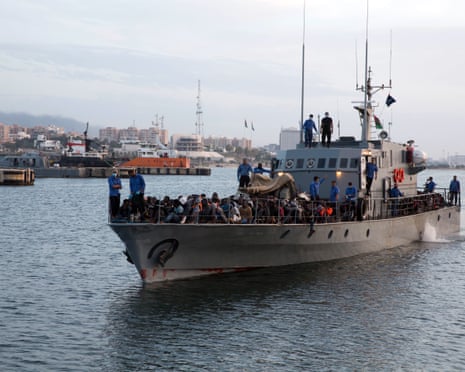
More than a dozen NGO rescue vessels operating in the Mediterranean have suspended communication with the Libyan coastguard, citing escalating incidents of asylum seekers being violently intercepted at sea and taken to camps rife with torture, rape and forced labour.
The 13 search-and-rescue organisations described their decision as a rejection of mounting pressure by the EU, and Italy in particular, to share information with the Libyan coastguard, which receives training, equipment and funding from the EU.
In an effort to reduce the number of people arriving in Europe, the EU has long faced accusations of ignoring widespread abuse and systematic human rights violations against people in Libya.
In 2021, a UN investigation found that migrants, asylum-seekers and refugees in Libya were subjected to a “litany of abuses” in detention centres and at the hands of traffickers, with one member of the mission noting that the findings were “suggestive of crimes against humanity”.
This week, the search-and-rescue organisations described the Libyan coastguard as an “illegitimate actor at sea”, noting that Libya was not a place of safety for refugees.
“We have never recognised these actors as a legitimate rescue authority – they are part of a violent regime enabled by the EU,” said Ina Friebe, of the German activist group CompassCollective, in a joint statement put out by the 13 organisations.
“Now we are increasingly being pressured to communicate with exactly these actors. This must stop,” she said. “Ending all operational communication with the so-called Libyan Rescue Coordination Center is both a legal and moral necessity – a clear line against European complicity in crimes against humanity.”
The organisations acknowledged that the decision could result in them facing fines, detentions and the confiscation of their rescue vessels.
Giulia Messmer, of Berlin-based Sea-Watch, said: “It is not only our right but our duty to treat armed militias as such in our operational communication – not as legitimate actors in search-and-rescue operations.”
In the past 10 years, rescue organisations operating in the Mediterranean have saved more than 155,000 people from drowning.
In doing so, they have come under increased pressure; campaigners have criticised an escalating crackdown on them by Italy, where hardline rules have blocked vessels from leaving port for a collective total of more than 700 days, while in August, Libya’s coastguard was accused of firing on a vessel belonging to SOS Méditerranée.
A report published last month by Sea-Watch accused the Libyan coastguard of 54 violent incidents since 2016, including shootings, ramming vessels, and threatening and assaulting people in distress.
The search-and-rescue organisations said this week that they had launched a new alliance, the Justice Fleet, whose website would track incidents involving the Libyan coastguard and compile information on legal cases pursued by the NGOs.
The NGOs behind the alliance – the largest group of civil search-and-rescue organisations to date – described it as a means of pushing back against the escalating pressure they faced.
“For 10 years, civil sea rescue has been providing first aid in the Mediterranean. For that, we have been blocked, criminalised, slandered,” the Justice Fleet website said. “That’s why we are joining forces now, stronger than ever – to defend human rights and international maritime law together.”